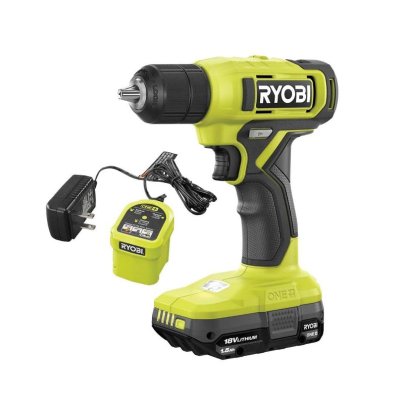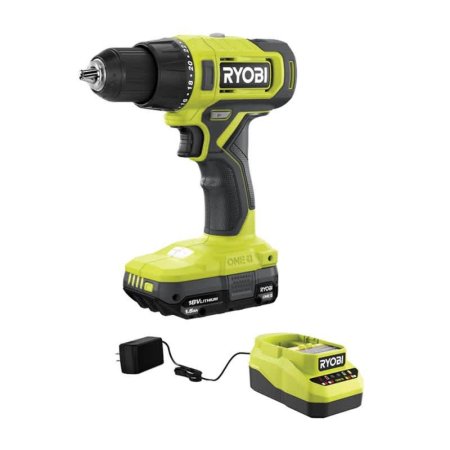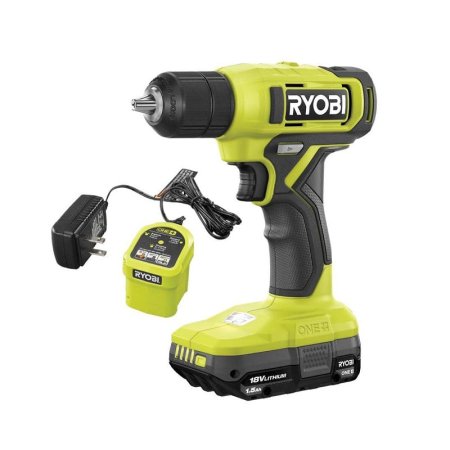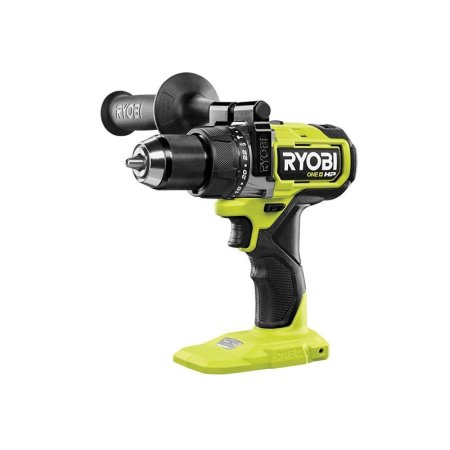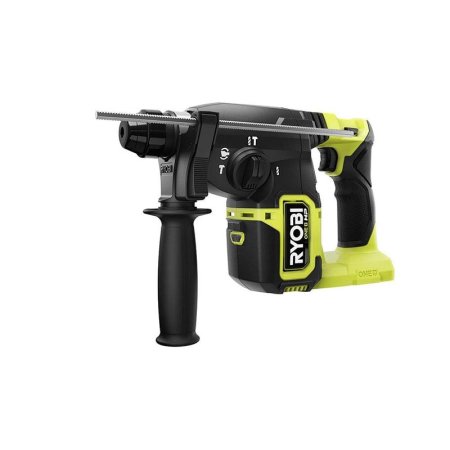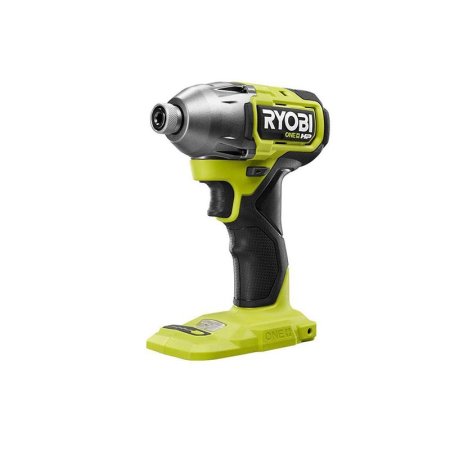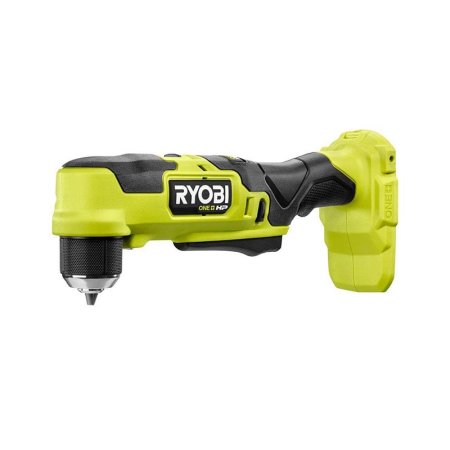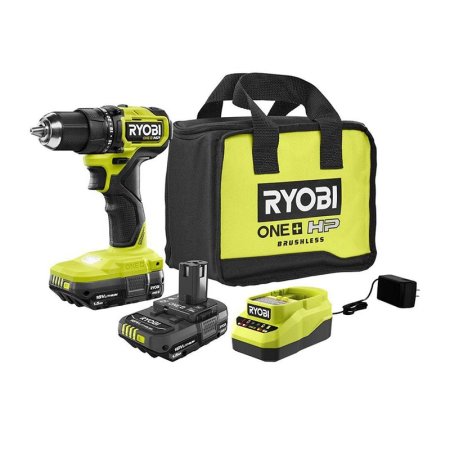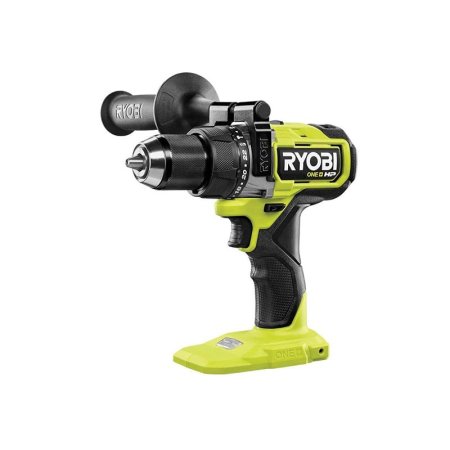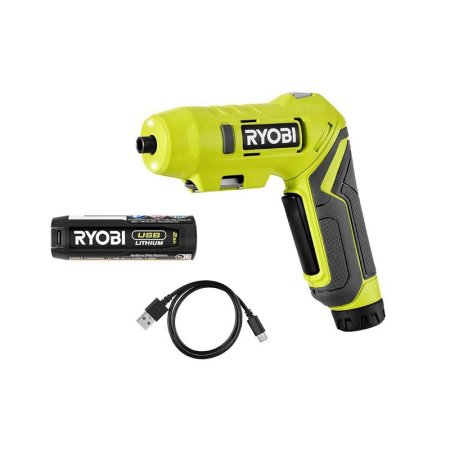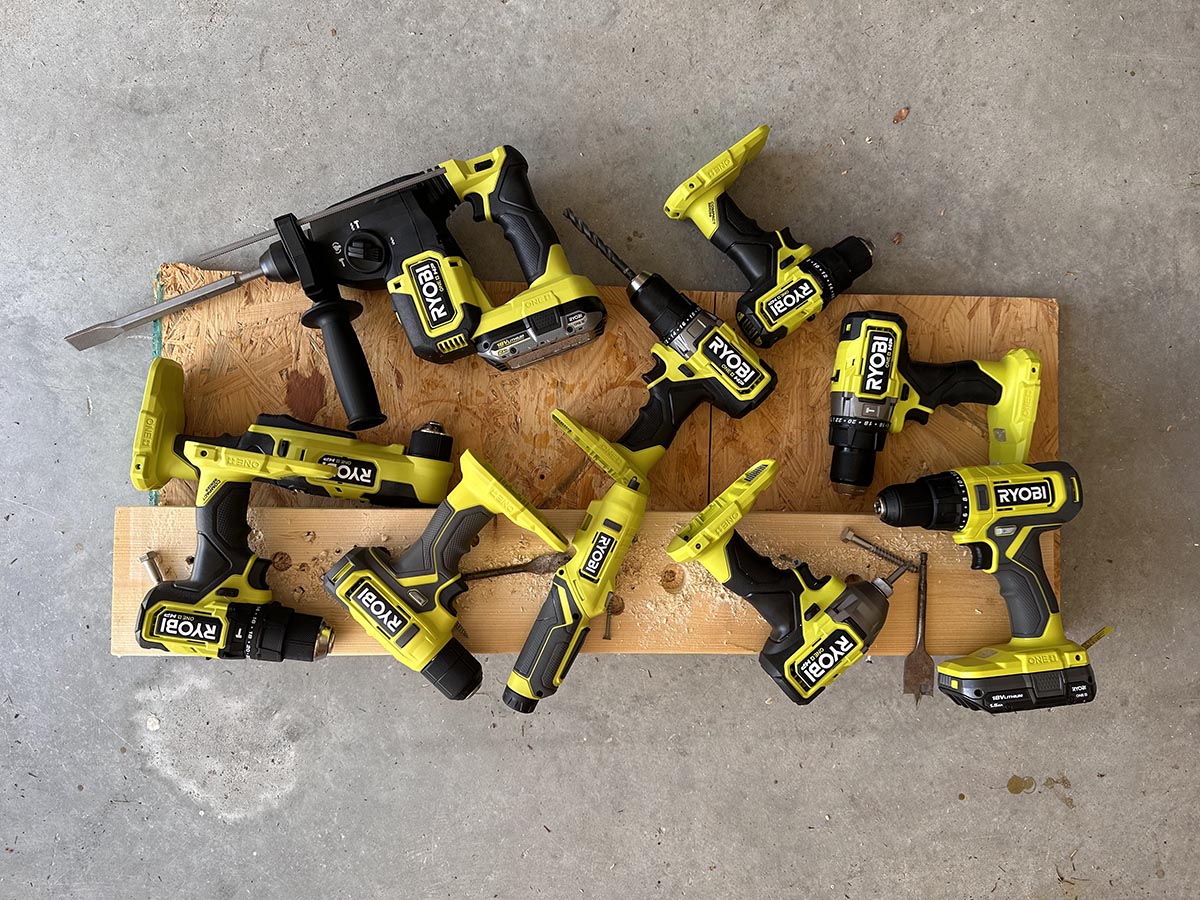
We may earn revenue from the products available on this page and participate in affiliate programs. Learn More ›
There’s a reason so many DIYers have a Ryobi drill or two in their arsenal of power tools. An in-house brand of The Home Depot, Ryobi offers a great mix of performance and affordability that makes them a popular choice for weekend warriors. We recently tested 10 of the best Ryobi cordless tools, including cordless drills, brushless impact drivers, and heavy-duty hammer drills. We found that our favorite of the bunch, the Ryobi ONE+ 18V ½-Inch Cordless Drill/Driver Kit, offers great speed and torque at a very attractive price.
Ryobi’s line of drills is quite broad, which can make finding the right one for your workshop a challenge. Below, we detail our findings regarding Ryobi’s line of cordless drills and offer our advice for what you’ll want to consider while browsing through the best Ryobi drills for your next home improvement project.
- BEST OVERALL: Ryobi ONE+ 18V ½-Inch Cordless Drill/Driver Kit
↓ Jump to Review - BEST BANG FOR THE BUCK: Ryobi ONE+ 18V ⅜-Inch Cordless Drill/Driver Kit
↓ Jump to Review - UPGRADE PICK: Ryobi ONE+ 18V ½-Inch Brushless Drill/Driver
↓ Jump to Review - BEST HEAVY-DUTY DRILL: Ryobi ONE+ 18V SDS-Plus Brushless Rotary Hammer
↓ Jump to Review - BEST IMPACT DRIVER: Ryobi ONE+ HP 18V ¼-Inch 4-Mode Impact Driver Kit
↓ Jump to Review - BEST RIGHT-ANGLE DRILL: Ryobi ONE+ 18V ⅜-Inch Cordless Right Angle Drill
↓ Jump to Review - BEST COMPACT DRILL: Ryobi 18V ONE+ HP Compact Brushless Drill/Driver Kit
↓ Jump to Review - BEST HAMMER DRILL: Ryobi ONE+ 18V ½-Inch Brushless Hammer Drill
↓ Jump to Review - BEST FOR DRIVING SCREWS: Ryobi USB Lithium Screwdriver Kit
↓ Jump to Review

| Testing Stats | |
| Products tested | 10 |
| Time spent testing | 4 hours |
| Tests performed | 5 |
| Price range | $80 to $240 |
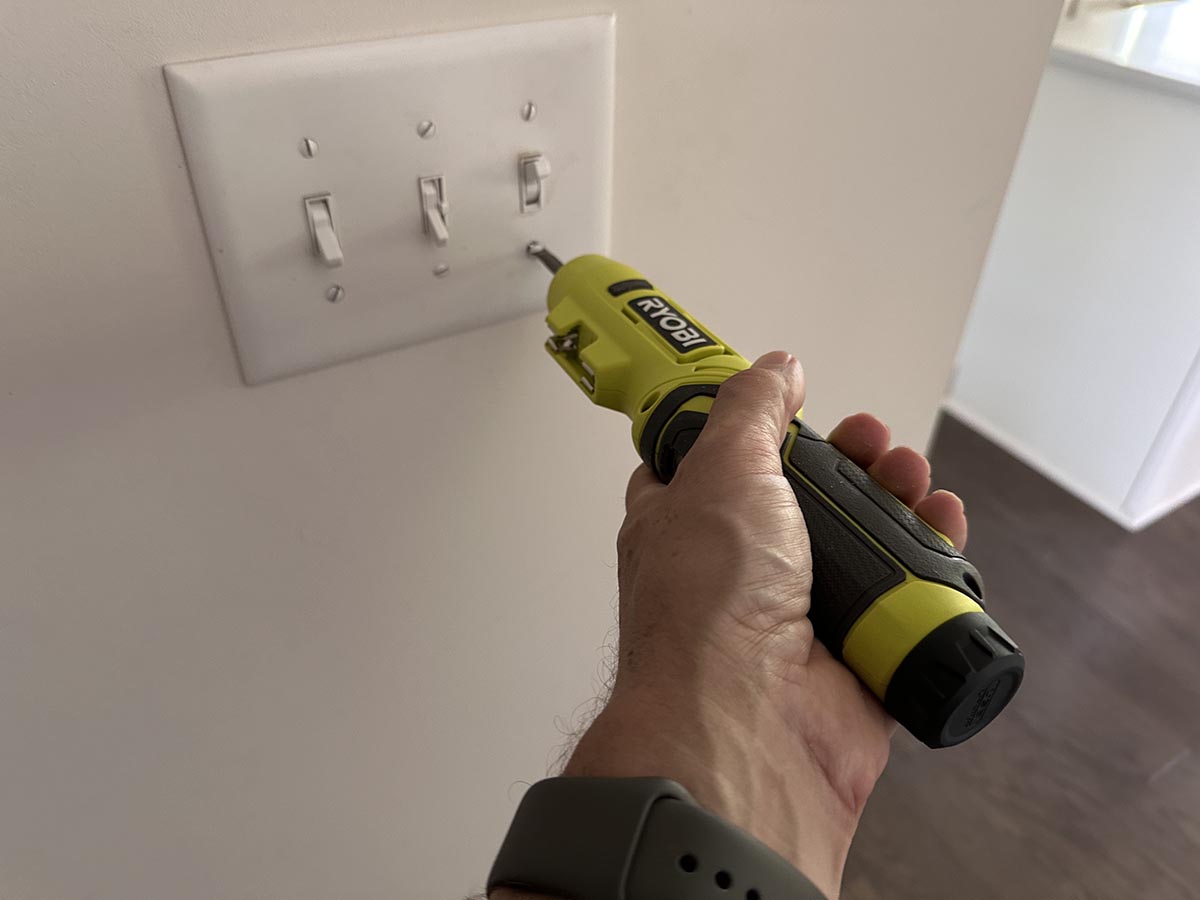
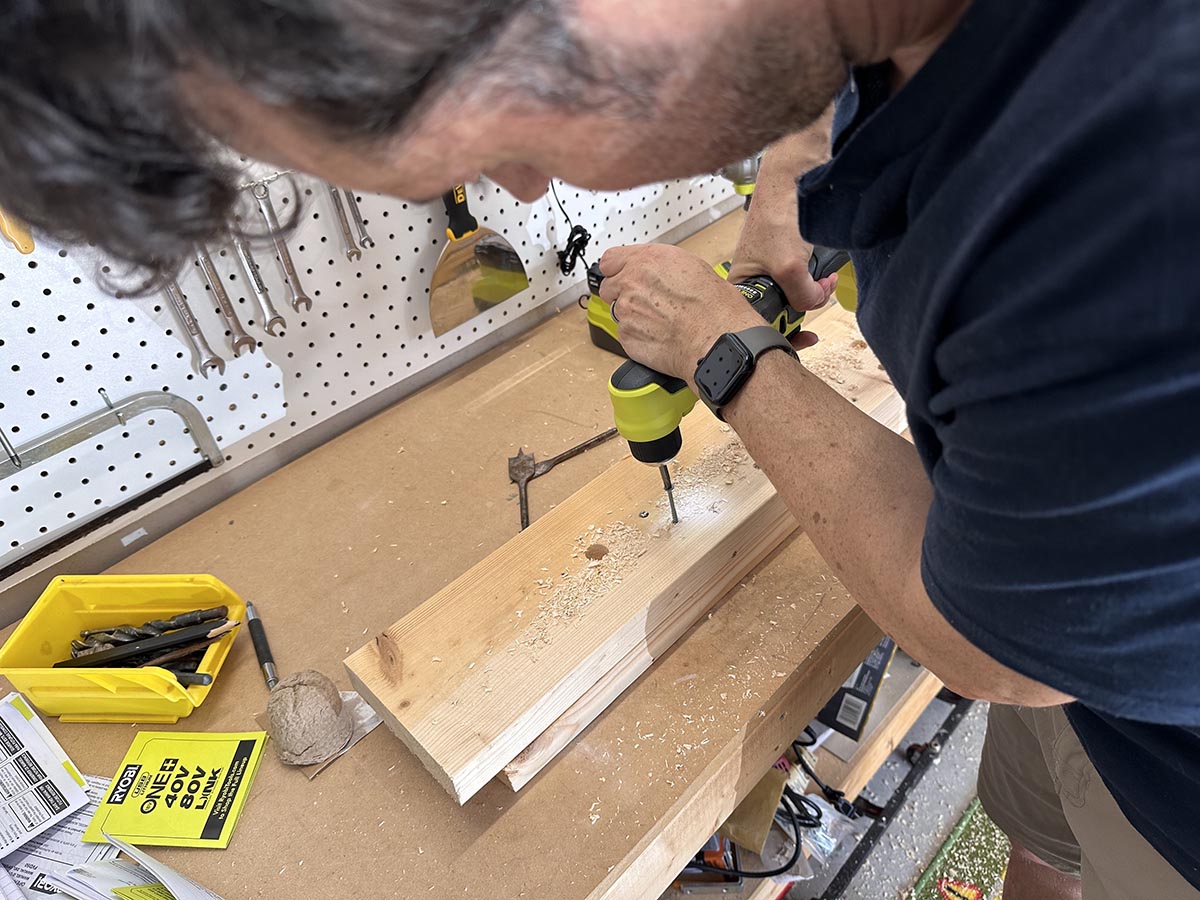
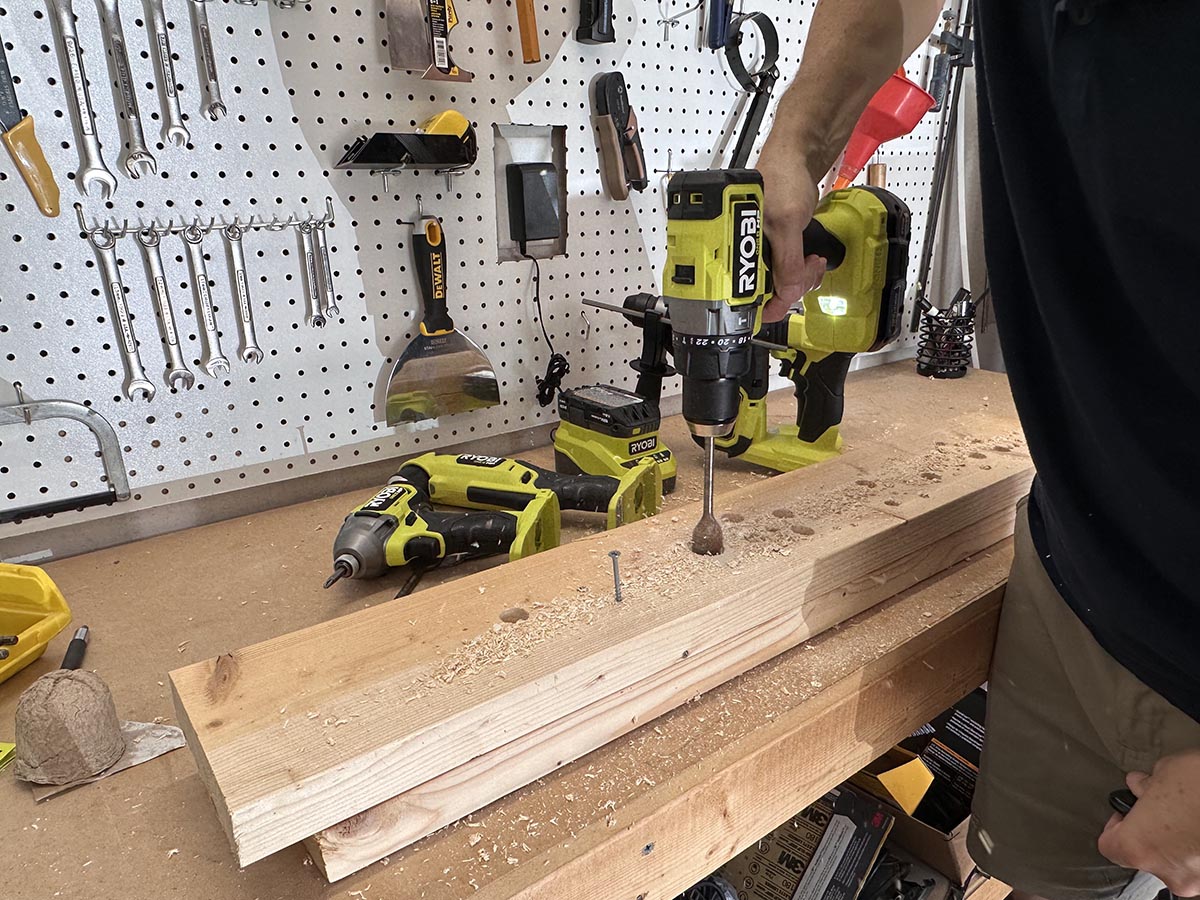
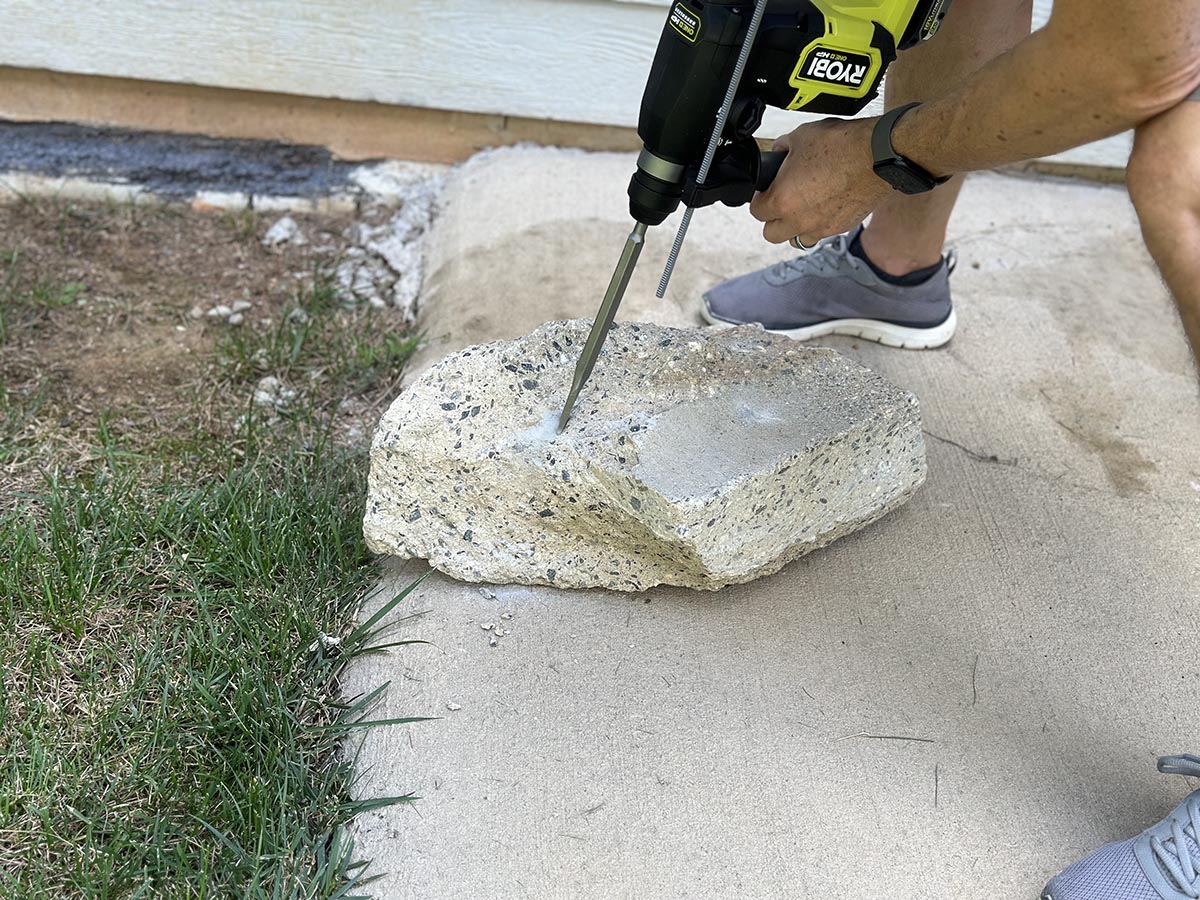
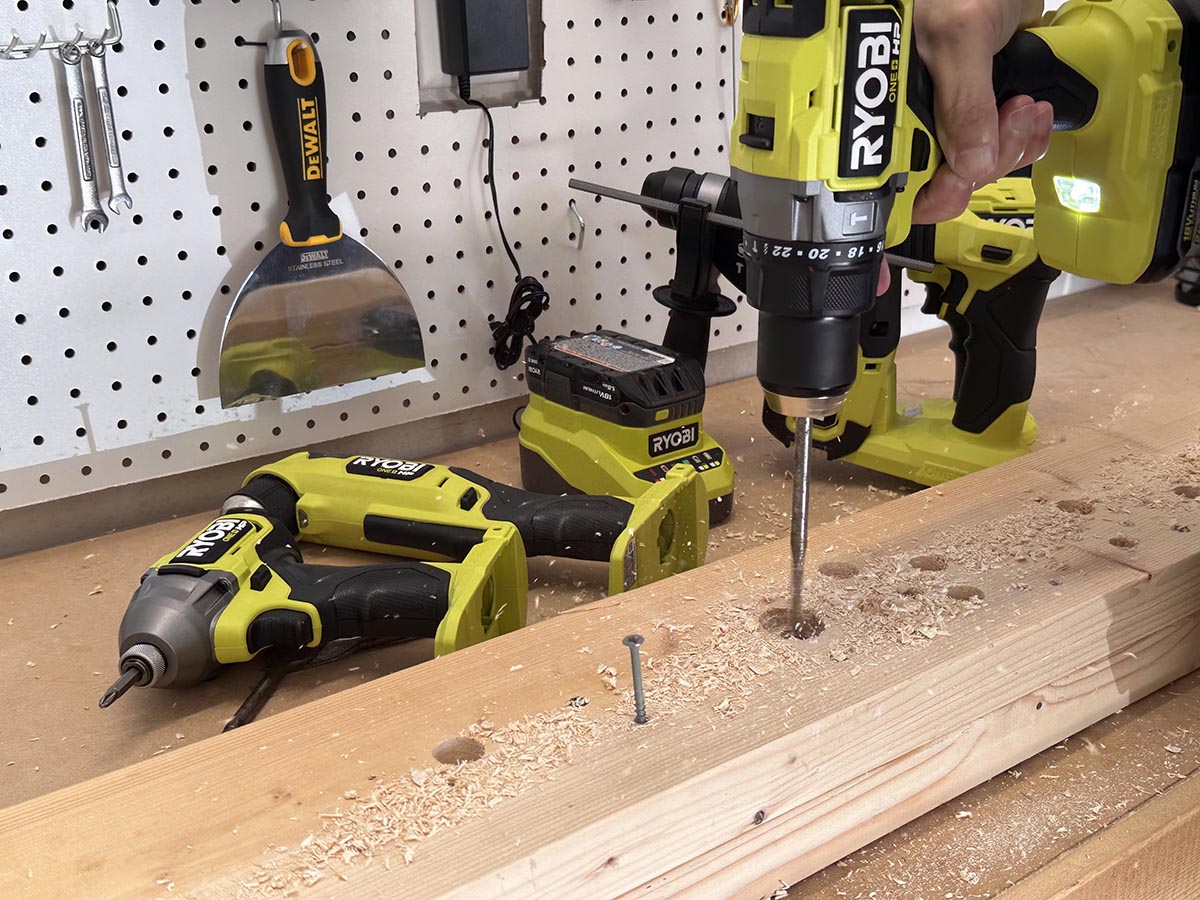
Our Top Picks
The list below includes some of the best Ryobi cordless tools, covering various drill types to suit different project needs.
Best Overall
Ryobi ONE+ 18V ½-Inch Cordless Drill/Driver Kit
Product Specs
- Max speed: 1,750 revolutions per minute (RPM)
- Max torque: 515 inch-pounds (in-lbs)
- Length: 7.8 inches
- Weight: 2.6 pounds
Our Ratings: Performance 5/5; Ease of Use 4/5; Durability 4/5; Value 4.5/5
What We Like
- Lightweight yet powerful model
- Impressive max speed can handle most DIY tasks
- Excellent cost value
What We Don’t Like
- Lacks a clip to attach to a tool belt
- Brushed motor
Ryobi’s best all-around drill is a cordless model capable of handling most of the drilling and screw-driving needs a DIYer would encounter. Its max speed of 1,750 RPM matches cordless drills offered by many higher-priced premium power tool brands.
That additional power was evident during testing. Drilling holes with a ⅛-inch bit was effortless. The drill also posted one of the fastest paddle bit speeds we recorded, drilling through a 2×4 in just four seconds. It was equally as impressive driving in 3-inch deck screws. Most notable about this drill is that its performance was virtually identical to Ryobi’s brushless version of its 18-volt ½-inch drill.
The only difference we noticed was a slight weight difference and a minor downgrade in build quality. While the brushless version has a metal chuck and brushless motor, this model has a plastic chuck and brushed motor. If you plan on using your drill regularly, spring for the brushless model. But for more moderate use, go with this standard ½-inch drill, which offers ample power and speed at a great price.
Get the PCL206K1 Ryobi drill at The Home Depot or Amazon.
Best Bang for the Buck
Ryobi ONE+ 18V ⅜-Inch Cordless Drill/Driver Kit
Product Specs
- Max speed: 600 RPM
- Max torque: 135 in-lbs
- Length: 7 inches
- Weight: 1.9 pounds
Our Ratings: Performance 4/5; Ease of Use 4.5/5; Durability 5/5; Value 4.5/5
What We Like
- Affordably priced kit compared to similar options
- High-performance despite smaller chuck size
- Lightweight design with compact head
What We Don’t Like
- Included charger takes longer to charge batteries
Not all drilling jobs require a ½-inch chuck, high speeds, and huge amounts of torque. With its modest max speed of 600 RPM, this ⅜-inch model is suitable for lighter-duty jobs. Although it may not be as powerful as some of Ryobi’s premium drills, it has many similar features, including an ergonomic grip with a large variable-speed trigger and multiple clutch positions for controlling torque.
Given the small chuck size of this drill, we were impressed with how well it handled drilling larger holes and driving in longer fasteners. Yes, it was slower than the ½-inch drills we also tested (as it should be); compared to those ½-inch models, it took 3 seconds instead of a single second to drill small holes and twice as much time to drill a ⅜-inch hole with the paddle bit. Still, it was able to handle everything we threw at it without binding or hesitating in the wood.
As expected, this drill is lighter and more compact than Ryobi’s ½-inch drills. It weighs less than 2 pounds and measures just 7 inches from the tip of the chuck to the back of the head. It also comes with a lighter-duty charger that takes longer to recharge the batteries. That said, if you’re after a light-duty drill that’s still capable of handling bigger jobs, albeit a little more slowly, then it’s a great drill at a very low price.
Get the PCL201K1 Ryobi drill at The Home Depot.
Upgrade Pick
Ryobi ONE+ 18V ½-Inch Brushless Drill/Driver
Product Specs
- Max speed: 2,100 RPM
- Max torque: 750 in-lbs
- Length: 7.3 inches
- Weight: 2.5 pounds (without battery)
Our Ratings: Performance 5/5; Ease of Use 4/5; Durability 5/5; Value 4/5
What We Like
- Durable and efficient brushless motor
- Good build quality with metal clutch
- Lighter and more compact than brushed model
What We Don’t Like
- About the same performance as cheaper brushed version
Given the difference in speed and power output, we expected this brushless version of Ryobi’s ½-inch cordless drill to outdo the brushed version. It didn’t. Both drills were about the same when it came to drilling holes large and small and driving in fasteners short and long.
That’s not to say there’s no reason to spend a little more to get this drill. First, the brushless motor adds efficiency that results in a longer runtime on a single charge. Brushless tools also tend to last longer since they put less wear on the motor. This model also has a metal chuck, whereas the brushed model has a plastic one, adding to its durability. It’s also slightly lighter and a little shorter from tip to tail. Other features, like the LED light, multiple speeds, and clutch positions, are the same.
If you’re looking for a Ryobi cordless drill that can withstand more regular use, then this brushless model is worth the marginal additional cost. Only need a drill for a few DIY projects each year? Save money and go with the brushed version.
Get the PBLDD01 Ryobi drill at The Home Depot.
Best Heavy-Duty Drill
Ryobi ONE+ 18V SDS-Plus Brushless Rotary Hammer
Product Specs
- Max speed: 5,000 blows per minute (BPM) and 1,380 RPM
- Max torque: N/A
- Length: 14.5 inches
- Weight: 4.3 pounds
Our Ratings: Performance 5/5; Ease of Use 5/5; Durability 5/5; Value 4/5
What We Like
- Works as a drill and a hammer drill
- Brushless motor provides long runtime motor life
- Easily switches modes with turn of a dial
What We Don’t Like
- Heavier weight can tire user with extended use
The Ryobi ONE+ SDS-Plus rotary hammer drill is built to tackle heavy-duty jobs, such as drilling holes in concrete, chipping out old tile, and driving in large lag bolts. As drills go, this one is a beast—and a versatile one at that.
Ryobi has been making increasingly powerful tools in recent years, and this rotary hammer is a great example of that. It blazed through drilling ½-inch holes in concrete and had no problem chipping off chunks of concrete with a chisel blade. We loved its three drilling modes, which made it easy to pivot from boring through rock to chipping through stone to driving in fasteners.
In terms of build quality, the handle and housing do a nice job of dampening vibration while chipping away cement. That said, the drill has mostly plastic construction, and the extra handle attachment has more play in it than we would like, though it feels solid enough to handle regular use. Overall, this rotary hammer drill is a great example of how far Ryobi’s drills have come in terms of performance. It’s the ideal tool for homeowners taking on heavy-duty drilling jobs.
Get the P223 Ryobi drill at The Home Depot.
Best Impact Driver
Ryobi ONE+ HP 18V ¼-Inch 4-Mode Impact Driver Kit
Product Specs
- Max speed: 2,900 RPM
- Max torque: 2,200 in-lbs
- Length: 5.6 inches
- Weight: 2.3 pounds
Our Ratings: Performance 4.5/5; Ease of Use 4/5; Durability 5/5; Value 4.5/5
What We Like
- Die-cast metal gear case
- High torque output
- 4 speed options for versatility
What We Don’t Like
- Auto speed setting doesn’t work well
While Ryobi may not typically be a brand you’ll find in a professional’s power tool arsenal, this impact driver has the chops to hang with those premium brands on a professional jobsite. It can deliver up to 2,200 in-lbs of torque and 4,000 impacts per minute, putting it in the same ballpark as some of the more powerful impact drivers out there.
This translated to impressive performance during testing. We drove a 3-inch lag bolt into a couple of stacked 2x6s in just 5 seconds. The build quality and features also impressed us. For starters, it has a die-cast metal gear case that feels like it could take a beating. You can also change torque and speed with four speed settings to cycle through at the push of a button on the base of the driver. This made it easy to dial all that power down for driving in smaller fasteners. Our only complaint was with the auto speed setting, which had a very jerky performance that made it difficult to use. That gripe aside, Ryobi’s top-of-the-line impact driver offers pro-level power and build quality at a very reasonable price.
Get the PBLID02B Ryobi drill at The Home Depot or Amazon.
Best Right-Angle Drill
Ryobi ONE+ 18V ⅜-Inch Cordless Right Angle Drill
Product Specs
- Max speed: 1,100 RPM
- Max torque: 130 in-lbs
- Length: 3.6 inches
- Weight: 2.4 pounds (without battery)
Our Ratings: Performance 4/5; Ease of Use 4.5/5; Durability 4/5; Value 4/5
What We Like
- Short head is ideal for tight spaces
- Good max speed for smaller-duty jobs
- Ergonomic oversize grip makes it easy to maneuver
What We Don’t Like
- Slightly heavier and bulkier than other angle drills
When working in close quarters, such as under a sink or between narrowly spaced wall studs, a standard cordless drill is often too long to fit, requiring the services of an angle drill. With its short 3.6-inch long head, Ryobi’s right-angle drill is an ideal choice for jobs that require one to fit the drill into tight spaces. And despite its small head, it still produces a surprising amount of power and speed.
During testing, it drilled smaller holes and drove in smaller fasteners at similar speeds compared to other drills. And while it was certainly slower with the larger ¾-inch paddle bit and longer 3-inch fasteners, it didn’t struggle to drill those larger holes or drive in those longer fasteners. It simply took a little longer.
Other things we liked about this right-angle driver included the long paddle-style trigger and variable-speed control, both of which made it easier to operate and control speed while working in uncomfortable positions. Our only complaint is that because it measures over a foot long with the battery, it feels somewhat bulky and a little unbalanced. Still, for the price, it’s a great option for projects that require you to work in tighter confines.
Get the P241 Ryobi drill at The Home Depot.
Best Compact Drill
Ryobi 18V ONE+ HP Compact Brushless Drill/Driver Kit
Product Specs
- Max speed: 1,700 RPM
- Max torque: 450 in-lbs
- Length: 6.3 inches
- Weight: 2.1 pounds
Our Ratings: Performance 5/5; Ease of Use 5/5; Durability 5/5; Value 4/5
What We Like
- Excellent performance
- Small size and light overall weight
- Great build quality with metal chuck
What We Don’t Like
- Ryobi’s priciest ½-inch drill
Ryobi’s compact version of its ½-inch cordless drill driver retains much of the performance of its full-size ½-inch drills, only at a smaller size and lighter weight. According to our in-house measurements, Ryobi’s compact ½-inch drill weighs 2.1 pounds, which is about half a pound lighter than its two other ½-inch cordless drills. It also weighs about a full pound less than those drills.
This size and weight difference were noticeable during testing. The Ryobi compact drill felt lighter and more balanced in the hand, making it easier to maneuver and use for longer periods. We also liked the build quality. Like Ryobi’s brushless full-size ½-inch drill, this model also has a metal chuck. In terms of performance, the compact version was on par with its larger counterpart, driving in longer fasteners and drilling smaller holes effortlessly while carving out larger holes with a ⅜-inch paddle bit in about 5 seconds.
We should note that as with the compact version of drill drivers with other power tool brands, this one is pricier than the full-size versions. You’re essentially paying for its smaller size and lighter weight. That said, if having a compact drill driver suits your project demands, it may be worth springing for.
Get the PSBDD02K2 Ryobi drill at The Home Depot or Amazon.
Best Hammer Drill
Ryobi ONE+ 18V ½-Inch Brushless Hammer Drill
Product Specs
- Max speed: 31,000 BPM and 2,100 RPM
- Max torque: 750 in-lbs
- Length: 7.5 inches
- Weight: 3 pounds (without battery)
Our Ratings: Performance 4.5/5; Ease of Use 4/5; Durability 5/5; Value 4.5/5
What We Like
- Powerful torque and fast speed
- Lightweight and compact for a hammer drill
- 2 speeds and 24 clutch positions for versatility
What We Don’t Like
- A little on the heavy side
With a max output of 750 in-lbs of torque and a top speed of 2,100 RPM, Ryobi’s brushless hammer drill is the most powerful hammer drill the brand has to offer. To support these greater forces, Ryobi smartly trades the plastic construction found on many of its other cordless drills for a durable metal chuck and die-cast metal gear case.
The result is a very powerful tool. Wanting to see just how much this hammer drill could handle, we skipped right to a ¾-inch paddle bit, which it handled with ease. We then upped the ante and tested out a ½-inch standard drill bit. Again, it had no problem boring through a 2×6 board without hesitation. In short, this tool offers impressive power.
Along with giving you a lot of torque and speed, this drill also gives you a lot of control over its output thanks to its two speed settings and a 24-position clutch for adjusting torque. There’s also a side-mounted handle that gives you more control for tougher drilling. This hammer drill offers professional-grade power output at a price that’s more affordable than premium brands.
Get the PBLHM101B Ryobi drill at The Home Depot.
Best for Driving Screws
Ryobi USB Lithium Screwdriver Kit
Product Specs
- Max speed: 200 RPM
- Max torque: 55 in-lbs
- Length: 9.4 inches
- Weight: 0.9 pounds
Our Ratings: Performance 4/5; Ease of Use 4.5/5; Durability 4/5; Value 4/5
What We Like
- Compact size and light overall weight
- Can convert from pistol grip to in-line grip
- Ideal for driving smaller screws
What We Don’t Like
- Only has a single speed
Ryobi’s cordless screwdriver is a handy tool for light-duty jobs. With a max speed of 200 RPM and just 55 in-lbs of torque, it’s suitable for jobs that demand more delicate work, such as electrical work and removing and driving in screws on appliances.
With its convertible handle, it can function as both an in-line screwdriver or as a screw gun with a pistol grip, giving it great versatility. The pistol-grip style was ideal for getting a firm grip on the tool, while we found its in-line design ideal for working in small spaces, such as inside a cabinet or electronics.
While this cordless screwdriver lacks the power of Ryobi’s other drills, it’s also much lighter. With its small lithium-ion battery, it weighs less than a pound, making it ideal for jobs that require finesse over power. That said, we were disappointed with its lack of speed control. Since it only operates at one speed, we found ourselves overdriving switch plate screws fairly easily. It would be a much more effective tool with a variable-speed trigger.
Still, given its low price, it’s a great option if you want to upgrade your old-school screwdriver set with a power model.
Get the FVD50K Ryobi drill at The Home Depot.
Also Tested
The Ryobi ONE+ HP 18V Compact ½-Inch Hammer Drill Kit is a compact version of Ryobi’s hammer drill. While it was easier to handle and noticeably lighter during use, this came at the cost of power and build quality. Given these differences, and the fact that this compact model costs more, we’d be hard-pressed to recommend it over Ryobi’s brushless standard hammer drill unless the size and weight savings are critical to your project needs.
Jump to Our Top Picks
How We Tested the Best Ryobi Drills
We put each of the 10 drills through a series of rigorous tests to evaluate their performance. For drill/drivers, we attempted to drill through a 2×6 piece of lumber with a ⅛-inch drill bit and ¾-inch paddle bit, noting exactly how long it took each to drill through the board and whether the drill binded or stalled out while doing so.
We also tested each drill/driver and impact driver’s ability to drive 1½-inch and 3-inch screws into two stacked 2×6 boards. We tested the drilling ability of the two Ryobi hammer drills on our list by evaluating each one’s ability to drill holes with a ½-inch standard drill bit. On top of all that, we pushed the lone impact driver on the list to the limit by attempting to drive in a 3-inch-long lag bolt into two stacked 2x6s. As for the sole rotary hammer drill on the list, we used it to drill holes and chisel pieces off of a concrete landscaping block.
Aside from performance, we also considered size and weight—awarding points to drills with a compact design—and build quality, awarding points to drills equipped with metal chucks and gear cases.
Along with hands-on testing, we also used our test team’s own experience with drills and impact drivers from Ryobi and other brands to help inform our picks. Jenny Stanley, Bob Vila executive editor and product tester, says the following about Ryobi drills: “I have many Ryobi tools in my collection, but few are used as frequently as my trusty 18-volt drill/driver. It’s been my right hand through a DIY kitchen remodel and countless redecorating projects. A close second is my Ryobi impact driver, which I reach for when I need a little extra muscle. For example, it came through big-time when I replaced several interior doors and had to drive long screws through multiple 2x4s.”
Stanley’s two favorite Ryobi drills are previous models of the Best Overall and Best for Driving Bolts picks in our list of recommendations. “I’ve had them since 2010-ish, which speaks to their awesomeness in that I haven’t had to replace them in more than a decade!”
What to Consider When Choosing a Ryobi Drill
Since Ryobi offers a wide range of drills, shoppers will want to familiarize themselves with the different types and important attributes such as speed, torque, and chuck size. Learn about these and other important features of the best Ryobi drills ahead.
Type
- Power screwdrivers: Not to be confused with power drills, power screwdrivers are designed solely for driving screws. Ryobi’s power screwdrivers are either cylindrical or pistol shaped, and they run on small 4-volt batteries.
- Drill drivers: Ryobi offers various cordless and wired drills that can function as both powered screwdrivers and standard drills for boring holes. They produce more power than a screwdriver and use larger 18-volt batteries or a standard 120-volt outlet.
- Impact drivers: Impact drivers have a spring, hammer, and anvil inside them, creating a hammering action. Impact drivers create far more torque than drill drivers, making them ideal for driving longer screws or even bolts. They do not function well as a standard drill.
- Hammer drills: Like an impact driver, hammer drills work by applying impact. However, unlike an impact driver, which delivers rotational impact for driving fasteners, a hammer drill applies forward impact. This design makes a hammer drill ideal for creating holes in hard surfaces, such as concrete.
Size, Weight, and Chuck Size
Ryobi drills come in a variety of sizes and weights with different-size chucks. The distance from the back of the drill to the tip of the chuck determines how easily the drill can maneuver in tight spaces. Ryobi’s drills range from 5 inches long for its most compact drill to 11.5 inches long for its most powerful hammer drill. Since a cordless drill is designed to be wielded with one hand, its weight will determine how easy it is to maneuver, especially during longer jobs. Ryobi drills vary in weight from 3 to 5 pounds.
Ryobi’s drills come in ⅜-inch and ½-inch chuck sizes. Both have their advantages and disadvantages. A ½-inch chuck can hold drill bits with larger shanks and produce greater torque; however, a ⅜-inch drill can spin faster than a ½-inch drill. Smaller drills also offer greater speed and torque control, making them ideal when driving with smaller fasteners or working with thinner drill bits.
Torque and Speed
A drill uses a gearbox to transfer power from the motor to the chuck. Depending on the size and type of motor, that power transfer creates a certain amount of torque and speed. Speed is measured in RPM, indicating how fast the drill chuck can spin. This determines how fast one can drill holes or drive in fasteners. Torque measures the maximum amount of turning force a drill has. The greater the torque, the better the drill can drive through harder materials or create larger holes. A drill with greater torque is also better equipped for driving in large fasteners, such as a 3-inch deck screw or heavy lag bolt.
Most Ryobi drills have adjustable clutches, which allow the user to alter how much torque the drill delivers. This ability to regulate torque is crucial for preventing the drill from twisting off screw heads or driving a fastener too deeply into a material. Many Ryobi drills also include speed controls that allow the user to slow the drill down for certain applications.
Motor
Ryobi drills come with either a brushed or brushless motor. Brushless motors create less friction than brushed motors, allowing them to reach greater speeds and generate more torque without overheating. The brushless design also makes this type of motor more efficient, allowing a runtime of up to 50 percent longer on a single charge while extending the motor’s life. Ryobi drills with brushless motors are significantly more expensive than their brushed counterparts.
Battery
Ryobi drills use either 4-volt or 18-volt rechargeable batteries. The smaller 4-volt batteries are reserved for its cordless screwdrivers, while the 18-volt batteries can be found on the brand’s entire line of cordless drills and impact drivers. The smaller 4-volt batteries and Ryobi’s cordless screwdriver produce less speed and torque, making these tools ideal for situations where precision is valued over torque and power. The larger 18-volt batteries can produce enough juice to drill holes or drive fasteners into denser material.
Additional Features
Ryobi’s drills come with standard features that make them easier to use. Most, though not all, include built-in work lights that help illuminate the workpiece while drilling. Some Ryobi drills include attachments like bit storage and magnet trays, making it easier to keep fasteners and bits handy. Most Ryobi drills also have oversize grips that extend beyond the handle, ideal for applications that require two hands.
FAQs
Find out why you don’t need to buy a battery for your new cordless Ryobi drill if you already own cordless Ryobi products, what to do if you can’t get the bit out of the drill’s chuck, and the answers to even more commonly asked questions about this product line.
The Ryobi ONE+ system is a collection of over 300 cordless Ryobi power tools that all use the brand’s proprietary lithium-ion batteries. This system allows users to use the batteries interchangeably across all Ryobi ONE+ products.
Getting a drill bit out of a Ryobi drill depends on the chuck type. Drills with keyless chucks allow the user to loosen the drill bit by hand by twisting the chuck counterclockwise. Some Ryobi drills require the user to loosen the chuck using a chuck key included with the drill.
Sometimes, a drill chuck can get locked if it’s opened too wide while attempting to put a larger bit inside. To unlock a locked chuck on a Ryobi drill, wrap it in a cloth, grip it tightly with a pair of pliers, and turn the chuck clockwise to break it free. Next, turn the chuck until the jaws are completely closed to reset it.
While the drill can last for many years if properly maintained, the batteries that power it will typically only last for 3 to 4 years before they lose the ability to reach their maximum charge.
You can use a Ryobi drill set to drill holes in concrete. The brand’s rotary hammer drill, the Ryobi ONE+ 18V 1-Inch SDS-Plus rotary hammer, is best suited for this job, though you can also use one of the brand’s more powerful hammer drills.
Meet the Tester
Tony Carrick is a freelance writer specializing in home improvement, landscaping, technology, home security, and design for such sites and publications as Popular Mechanics, Pro Tools Review, CNN Underscored, and This Old House Magazine.

